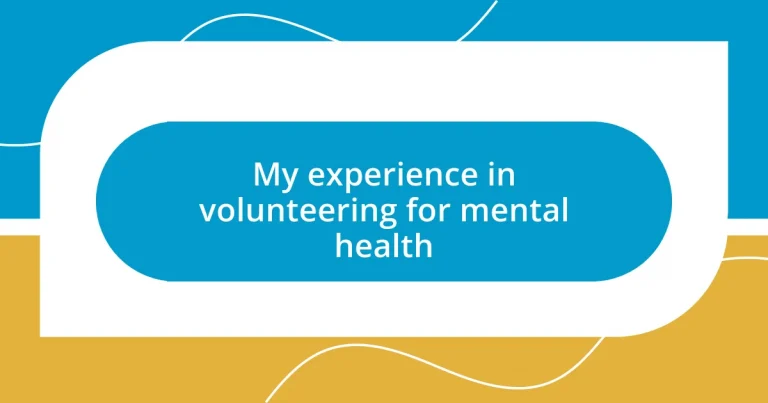Key takeaways:
- The importance of empathy and active listening in supporting individuals with mental health struggles, as demonstrated in interactions with people like Sarah and Tom.
- The personal growth experienced through volunteering, highlighting self-awareness, resilience, and the transformative power of sharing vulnerabilities.
- The significance of fostering a supportive community, where sharing stories and experiences can create connections and reduce mental health stigma.
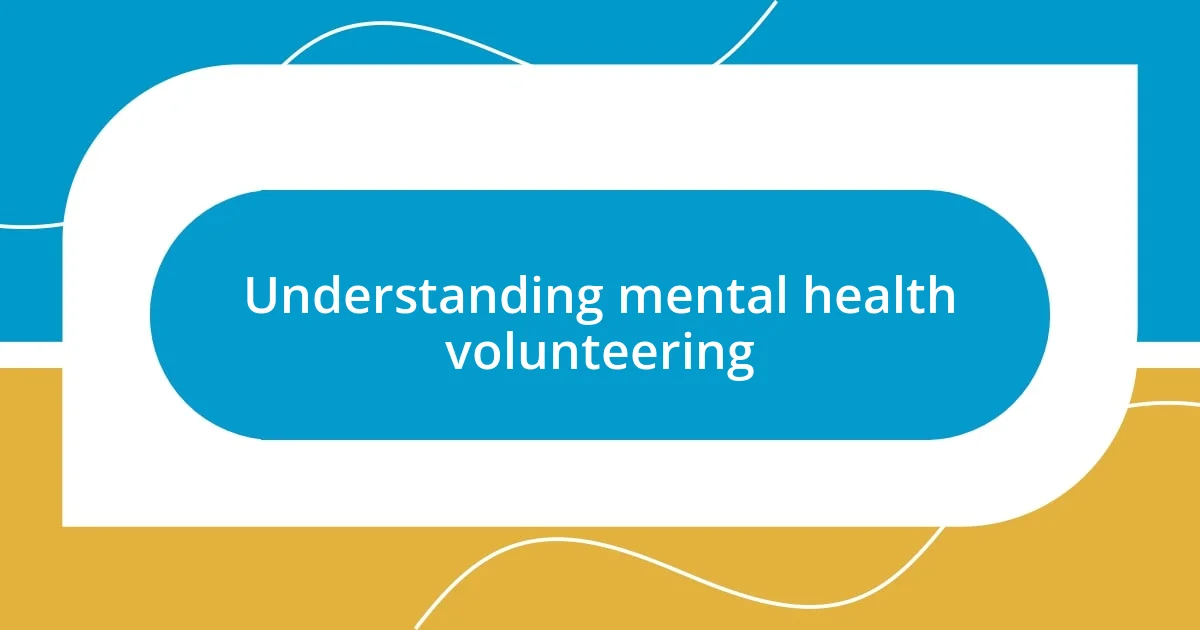
Understanding mental health volunteering
When I first stepped into the world of mental health volunteering, I was struck by how vital human connection is in this field. It made me realize that many individuals are silently struggling, and just being there to listen can be a transformative experience. Have you ever thought about how a simple conversation can lighten someone’s burden?
Volunteering in this area taught me the importance of empathy. I remember meeting a young woman named Sarah who felt completely isolated due to her anxiety. Our chats helped her open up about her feelings, and seeing her smile as she shared her progress reminded me of the profound impact we can have on each other. It’s like planting a seed of hope—sometimes, all it takes is one kind interaction to change a person’s day, or even their life.
I often reflect on the diversity within mental health volunteering. Each experience is unique, whether it’s supporting people in crisis, educating communities about mental health issues, or advocating for policy changes. I found that my role was not just about giving my time; it was about learning and growing alongside those we help. How can we foster an environment where everyone feels comfortable sharing their mental health journey? That’s a question I constantly ponder as I continue my volunteer work.
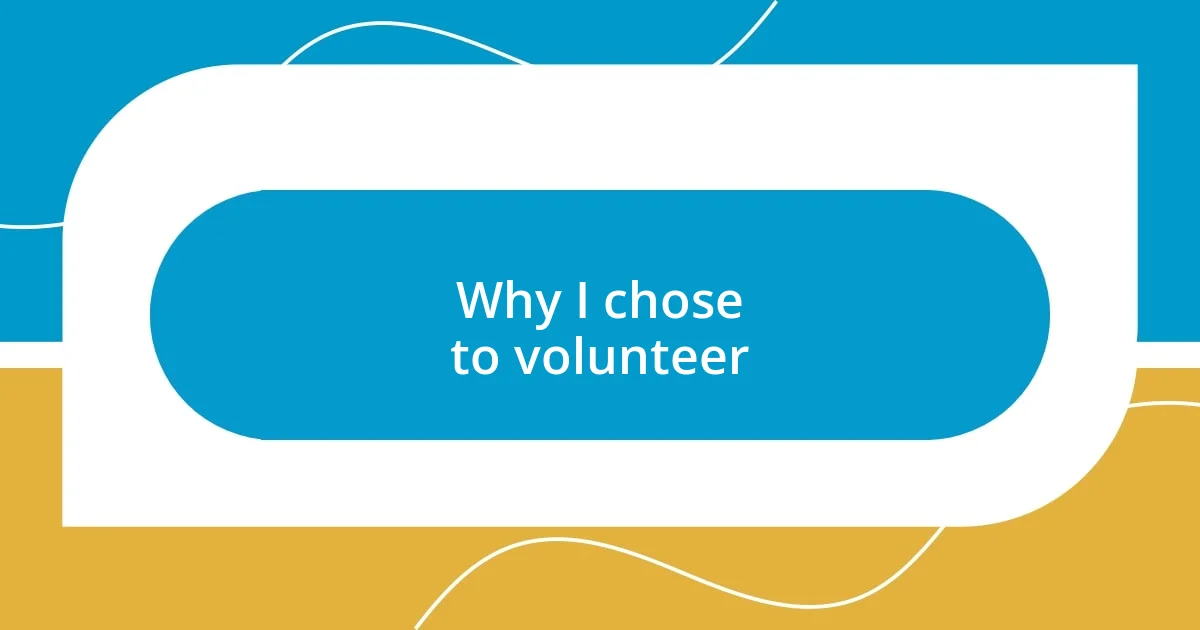
Why I chose to volunteer
Choosing to volunteer in mental health was not a decision I made lightly. I found myself reflecting on my own mental health journey, where I sometimes felt vulnerable and misunderstood. Volunteering felt like a way to transform my experiences into something meaningful, offering support to those who might be wrestling with similar challenges. When I think about it, does anyone truly walk through life untouched by mental health issues, whether directly or indirectly?
One particular moment stands out vividly in my mind. While serving at a local mental health clinic, I met an older gentleman named Tom, who shared his battle with depression. He opened up about how he felt invisible in a world that moved too fast. Listening to him made me acutely aware of how often people yearn to be heard, a reminder that, sometimes, my mere presence could hold immense value. It was a powerful lesson on the importance of being a compassionate listener—something I now carry with me in every interaction.
I also saw volunteering as an opportunity for growth. It pushed me out of my comfort zone, allowing me to confront my own biases and misconceptions about mental health. Every person I encountered taught me something new, whether it was about resilience or vulnerability. In some sense, my journey in volunteering became a path of self-discovery, highlighting the interconnectedness of our experiences. How often do we overlook the lessons others can teach us simply through sharing their stories?
| Reason for Volunteering | Personal Insight |
|---|---|
| Transforming Personal Experience | Channeling my journey into helping others |
| The Impact of Listening | Recognizing the power of being present |
| Opportunities for Growth | Confronting my biases and learning from others |
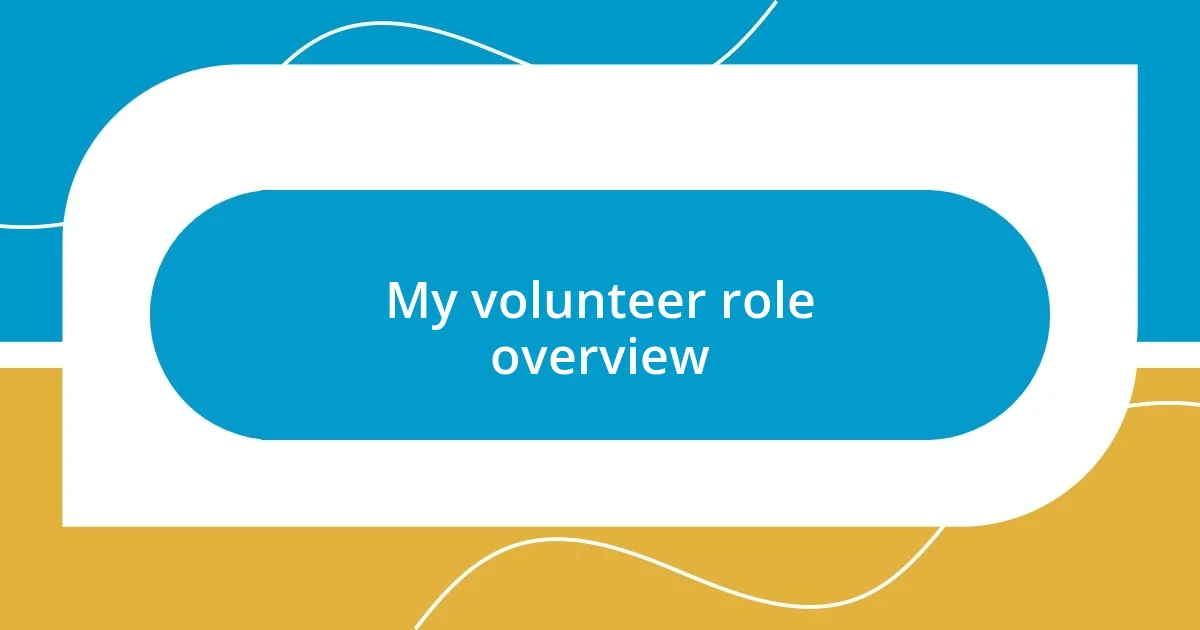
My volunteer role overview
My volunteer role placed me at the heart of a community looking for support and understanding. I found myself engaged as a peer supporter, where my main task was to facilitate group sessions that encouraged open dialogue about mental health. It was in these moments that I witnessed the incredible strength of vulnerability; being part of a circle where people felt safe enough to share their deepest struggles was nothing short of humbling.
- Facilitated discussions on overcoming anxiety and depression.
- Offered one-on-one support to individuals during times of crisis.
- Organized workshops aimed at increasing awareness about mental health resources.
- Collaborated with mental health professionals to enhance my own knowledge and skills.
In addition to leading workshops, I also volunteered in outreach programs aimed at breaking the stigma around mental health. I distinctly remember walking into a local high school, my heart racing at the thought of sharing my experiences. But once I started connecting with the students, I felt an immediate shift in the room. Their curiosity and willingness to learn reminded me why I was there. It was a powerful exchange where I not only educated them about mental health, but also learned from their fresh perspectives and fears.
- Engaged with students and facilitated discussions about mental health topics.
- Created informative materials to distribute during outreach events.
- Shared my personal story to inspire others to seek help.
- Developed partnerships with schools to promote ongoing mental health awareness.
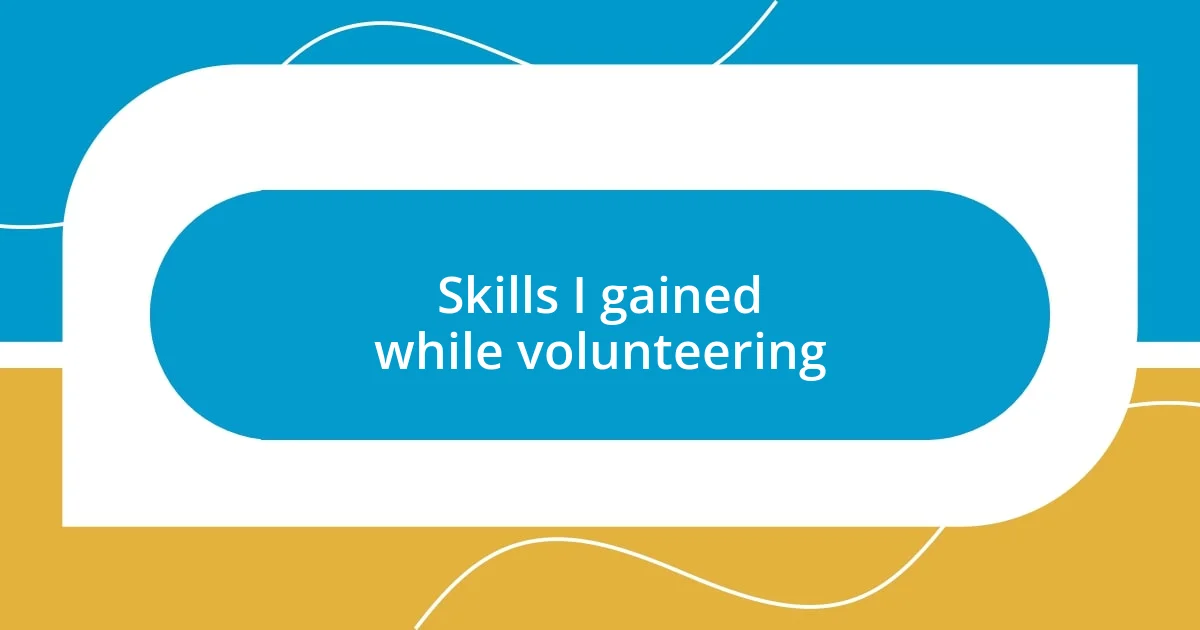
Skills I gained while volunteering
Volunteering for mental health opened my eyes to the invaluable skill of empathy. Engaging with individuals who shared their struggles deepened my understanding of what it means to truly connect with someone. I remember once sitting with a young woman who felt overwhelmed by anxiety. In those moments, I realized how vital it is to create a safe space for others to express their feelings without fear of judgment. This experience challenged me to consider—how often do we take the time to truly hear another person’s voice?
Through my role, I also honed my communication skills significantly. I learned to articulate my thoughts clearly, ensuring that others felt understood. One group discussion stands out; I had to facilitate a conversation about managing triggers. Reflecting on that moment, I realized how crucial it is to ask the right questions and encourage others to voice their experiences. How much of difference can a thoughtful question make in someone’s life? I found that sometimes, the right words become a bridge, helping someone navigate their thoughts and feelings.
Additionally, my organizational and leadership skills grew immensely while running workshops. Planning sessions that catered to various age groups and backgrounds required strategic thinking and flexibility. I recall an instance where I had to pivot a workshop on coping strategies mid-session due to an unexpected turnout. Adapting in real time taught me resilience and creative problem-solving—key skills not just for volunteering, but for every aspect of life. How often do we encounter situations that require us to think on our feet? Embracing this unpredictability has transformed how I approach challenges today.
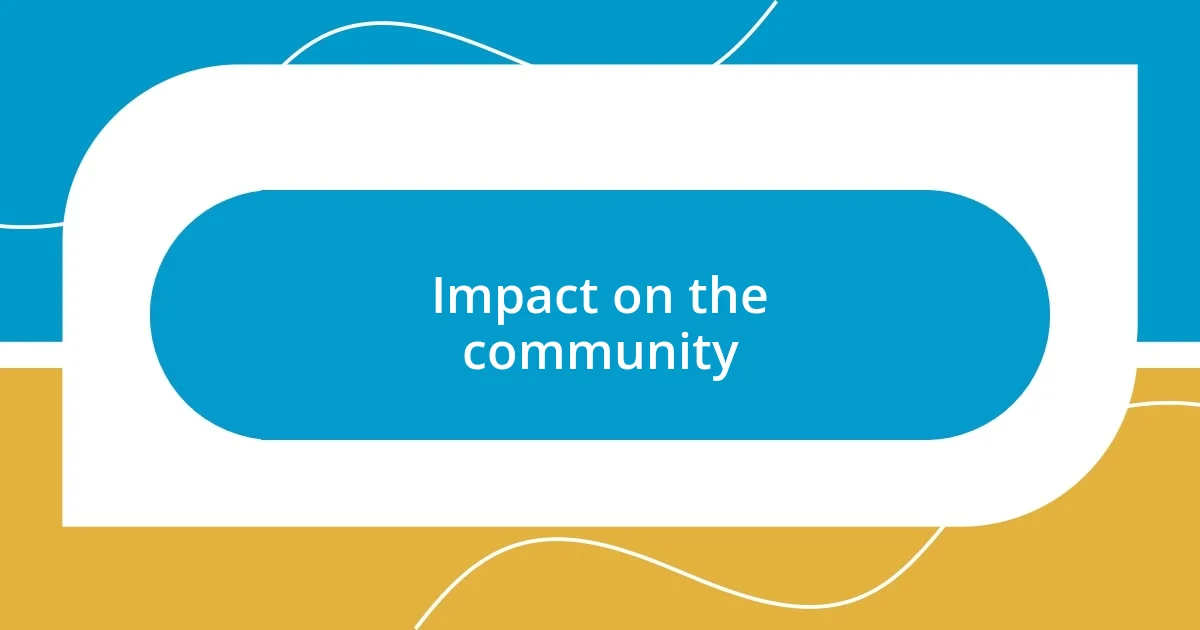
Impact on the community
Working as a peer supporter, I quickly realized the impact our discussions had on the community. During one session, a participant shared how expressing her struggles lifted a weight she hadn’t fully acknowledged before. It struck me that sometimes, simply being heard can spark healing; what’s more powerful than knowing that your story resonates with someone else?
I remember the joy of seeing attendees form connections outside of our sessions. One woman organized a coffee meetup for folks she had met through our group. Watching them bond over shared experiences made me wonder—how often do we underestimate the power of community in mental health? It’s a reminder that relationships can be a lifeline for those feeling isolated in their challenges.
One of my most memorable experiences happened during an outreach event at a local community center. I had the opportunity to speak to a diverse audience about mental health stigma. As I shared my story, I saw some heads nodding in understanding, and it made me think—how crucial is it for communities to embrace their mental health narratives? That day reinforced how vital it is to create spaces where conversations can flourish, ultimately strengthening the fabric of our community.
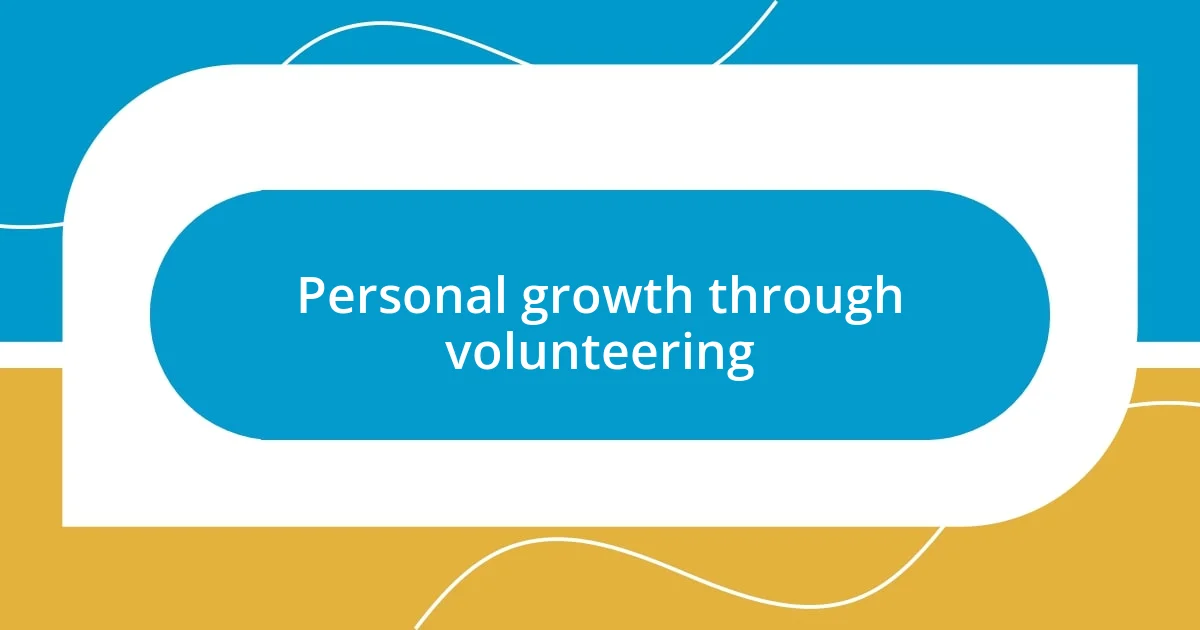
Personal growth through volunteering
Volunteering in mental health has been a profound journey of personal growth for me. Initially, I stepped in thinking I was there to help others, but it wasn’t long before I realized that each conversation also acted as a mirror reflecting my own understanding of resilience. I vividly recall a moment when a participant shared their story of overcoming depression. As I listened, I was struck by how their courage inspired me to confront my own challenges with greater vigor. Isn’t it fascinating how sharing vulnerabilities can transform them into sources of strength?
Every session turned out to be a lesson in self-awareness. One day, while leading a mindfulness workshop, I discovered my own tendency to rush through thoughts, often glossing over the present moment. This realization led to a personal commitment to practice mindfulness in my own life. I found myself asking—how can we truly support others if we can’t even pause to support ourselves? This pivotal moment reshaped my approach, reminding me that personal growth extends beyond skills; it’s about listening to that inner voice we often neglect.
Another aspect of my journey involved embracing the discomfort that comes with vulnerability. I remember my first time sharing my own mental health struggles in front of the group. The initial fear was palpable; yet afterward, an unexpected wave of relief washed over me. I learned that opening up does not just invite connection, but also deepens it. Have you ever felt lighter after sharing something that weighed you down? That experience taught me that my narrative could foster an environment where others felt safe to share their stories. In this way, volunteering became a powerful catalyst for my own healing journey while building bridges for others.
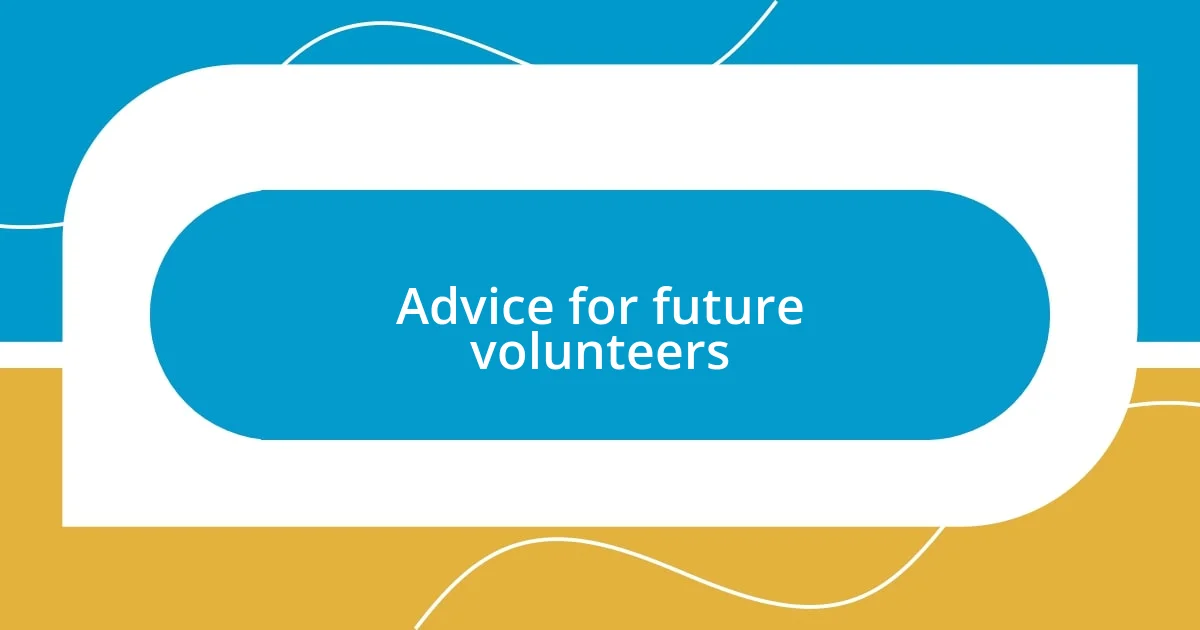
Advice for future volunteers
When considering volunteering for mental health, one crucial piece of advice is to embrace active listening. I remember a time when a participant opened up about their anxiety issues. Instead of jumping in with advice, I made it a point to simply listen, nodding and making eye contact. That moment taught me that sometimes, being present and genuinely hearing someone’s struggles can make all the difference. Have you ever felt more supported just because someone was there to listen?
It’s also essential to be open to learning, not just about mental health but about yourself. One afternoon, I facilitated a discussion about coping mechanisms, and when a volunteer shared their own unique strategy, it sparked an idea for my personal toolkit. It reminded me that every person you encounter can offer a new perspective or tactic that might resonate with you. How often do we forget that teaching and learning are reciprocal in such spaces?
Lastly, it’s vital to prioritize self-care while you volunteer. I recall feeling overwhelmed after several back-to-back sessions, realizing that my ability to support others depended on my own well-being. So, I started setting boundaries and carved out time for my own mental health. It’s an easy trap to fall into, but what good are we to others if we’re not whole ourselves? Take care of yourself first, and you’ll find that you can offer even more to those in need.












